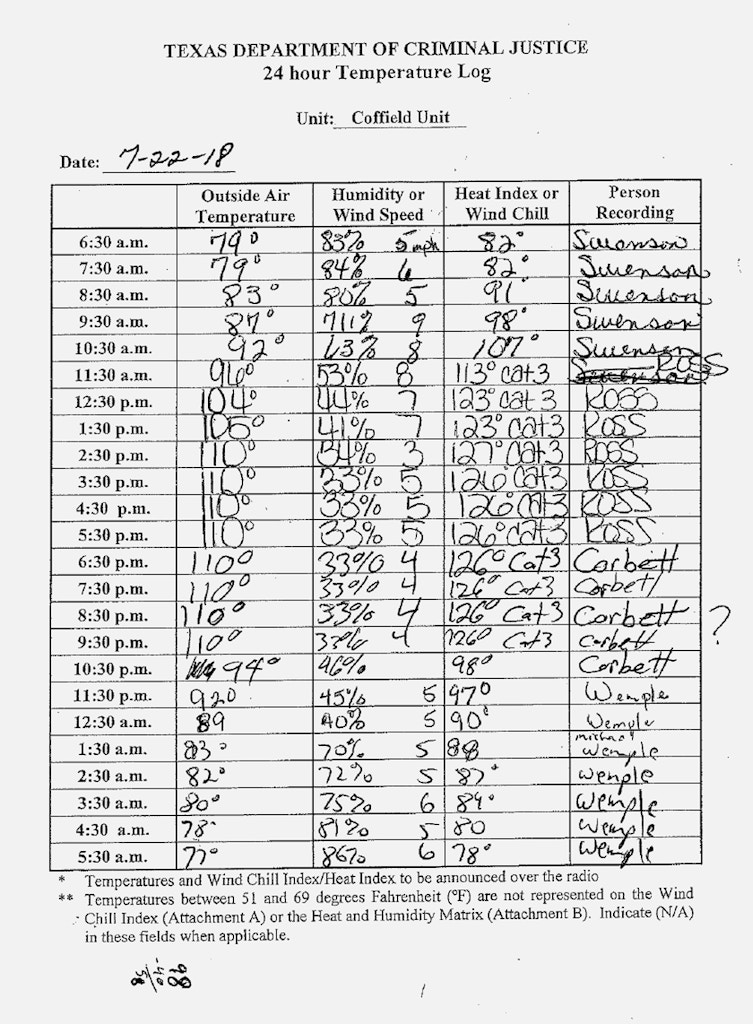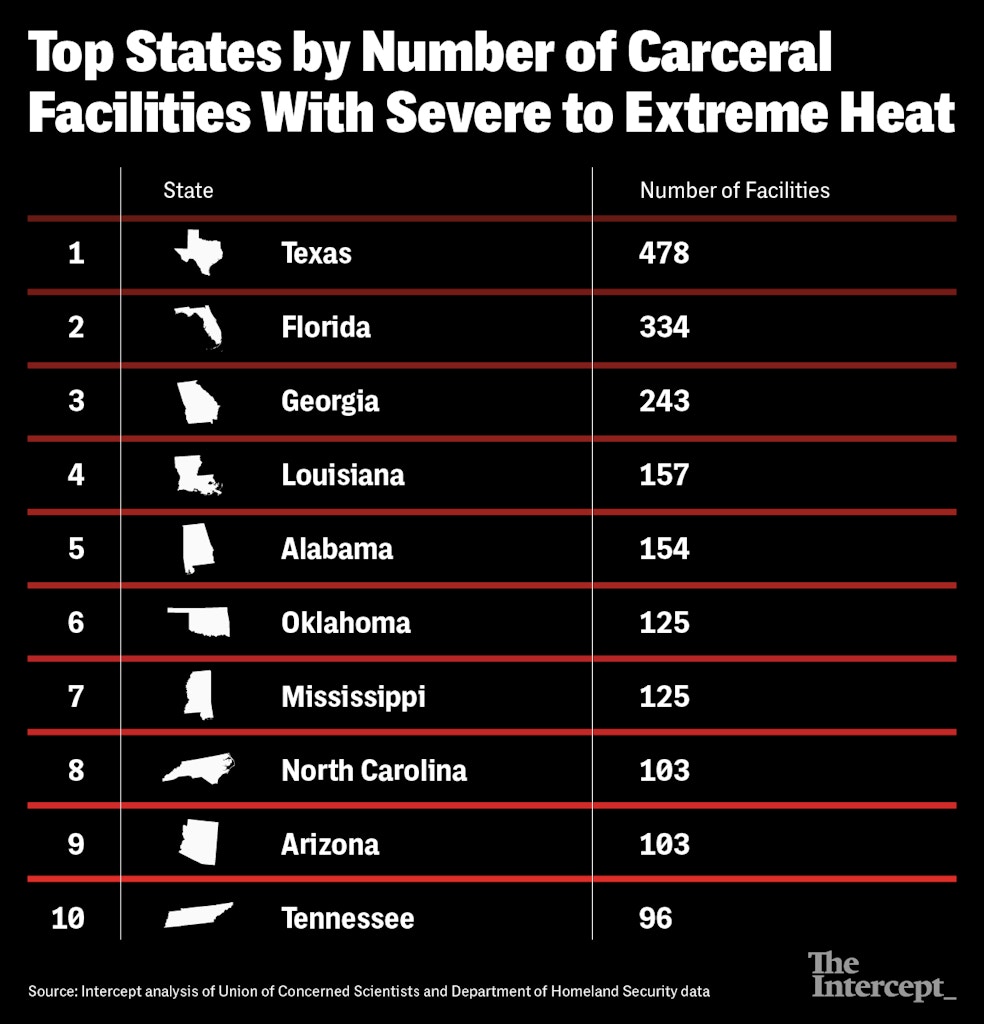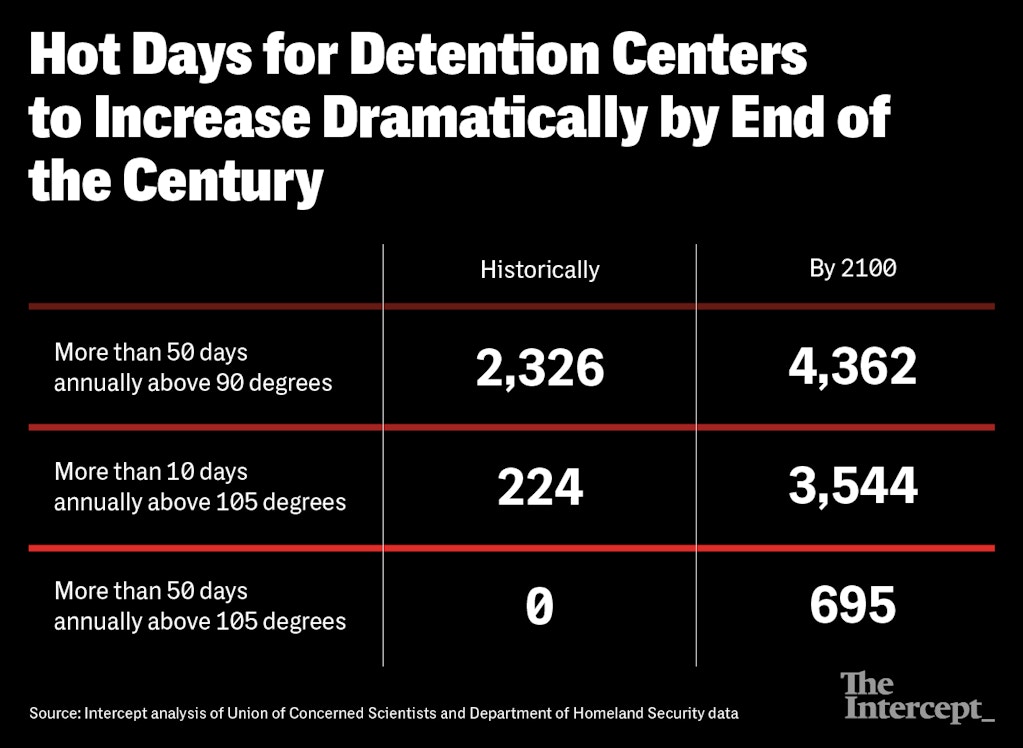Boiling Behind Bars
In Sweltering Texa, Prisons Without Air Conditioning Are About to Get a Lot Hotter
By Alleen Brown
Intercept
February 12, 2022
During the year Justin Phillips spent in an unair-conditioned segregation cell at the Coffield Unit, a state prison near Palestine, Texas, the soaring temperatures took a toll. All but eight days of June 2018 saw the heat index rise above 110 degrees. The blood pressure medicine Phillips takes to treat a rare kidney condition made him ill in high heat, so he would skip doses. At times, he said, guards failed to escort him to take his other medications.
“Someone diagnosed with pauci-immune glomerulonephritis” — Phillips’s diagnosis — “could get in trouble in a hurry if they’re exposed to heat, regardless of medications,” said Aaron Bernstein, an expert on climate and health at Harvard University’s School of Public Health.
With treatment, patients with the condition are expected to have a 75 percent five-year survival rate. By the time he left prison last year, Phillips had end-stage renal failure, and doctors told him the likelihood of surviving five years was 40 percent.
“I feel like they gave me a possible death sentence,” said Phillips, who is now 42, of the Texas prison system. “I don’t think they care.”
The Coffield Unit is among the hottest places in the nation for incarcerated people, according to an Intercept analysis of extreme heat in more than 6,500 jails, prisons, and detention centers across the U.S. — and it’s getting worse. As of 2020, Coffield was one of 21 Texas state prisons with no air conditioning, according to public records obtained by the Texas Prisons Air-Conditioning Advocates, an organization Phillips’s wife, Casey, founded.
That he was transferred out of his sweltering cell at all, Justin said,
was only due to Casey’s relentless advocacy. After months of calls,
emails, and formal complaints, Justin was transferred to an
air-conditioned unit. Four days before he was moved, the heat index
outside the Coffield Unit was recorded at 127 degrees.
That he was transferred out of his sweltering cell at all, Justin said, was only due to Casey’s relentless advocacy. After months of calls, emails, and formal complaints, Justin was transferred to an air-conditioned unit. Four days before he was moved, the heat index outside the Coffield Unit was recorded at 127 degrees.
Desperation spurred Casey Phillips to turn her work on her husband’s case into statewide activism. As an advocate, Casey reserves much of her ire for one man: “Honestly, it’s Greg Abbott that doesn’t care. It’s him,” she said, referring to Texas’s Republican governor.
For more than a decade, Abbott has been a key figure stymying the fight for air conditioning in Texas carceral facilities. When he was the state attorney general, Abbott defended the Texas Department of Criminal Justice from heat lawsuits. Today he sets the agenda for legislative sessions — where heat-relief bills, like the ones pushed by advocates like Casey Phillips, go to die. Casey was blunt about Abbott’s role in the stalled legislation: “He’s the problem.”
Desperation spurred Casey Phillips to turn her work on her husband’s case into statewide activism. As an advocate, Casey reserves much of her ire for one man: “Honestly, it’s Greg Abbott that doesn’t care. It’s him,” she said, referring to Texas’s Republican governor.
For more than a decade, Abbott has been a key figure stymying the fight for air conditioning in Texas carceral facilities. When he was the state attorney general, Abbott defended the Texas Department of Criminal Justice from heat lawsuits. Today he sets the agenda for legislative sessions — where heat-relief bills, like the ones pushed by advocates like Casey Phillips, go to die. Casey was blunt about Abbott’s role in the stalled legislation: “He’s the problem.”

The state prison system has spotty air-conditioning coverage at best. When the information was last made public in 2020, parts or the whole of around 70 Texas prisons, with a combined capacity of 122,000 potential inmates, had no air conditioning.
“If any other Texan doesn’t have AC, they can be in a shaded situation. They can drink more water. They can take a shower,” said Ariel Dulitzky, a human rights lawyer at the University of Texas at Austin School of Law and the co-author of a report on heat in prisons. “Persons deprived of their liberty are under the absolute control of the state. They cannot do anything.”
/https://static.texastribune.org/media/files/8e097f8701df854bfbaae3bf73638feb/01_Brazoria_County_Prison_JM.jpg)


 Justin Phillips
Justin Phillips
2 comments:
If they wanted cool and comfortable they should have committed their crimes in Minnesota.
Texas is hot. Air-conditioning is a luxury and any state government funds should be used for our elderly and veterans who cannot afford it. Prisoners can buy a 5' plastic blade fan in the commissary.
Post a Comment